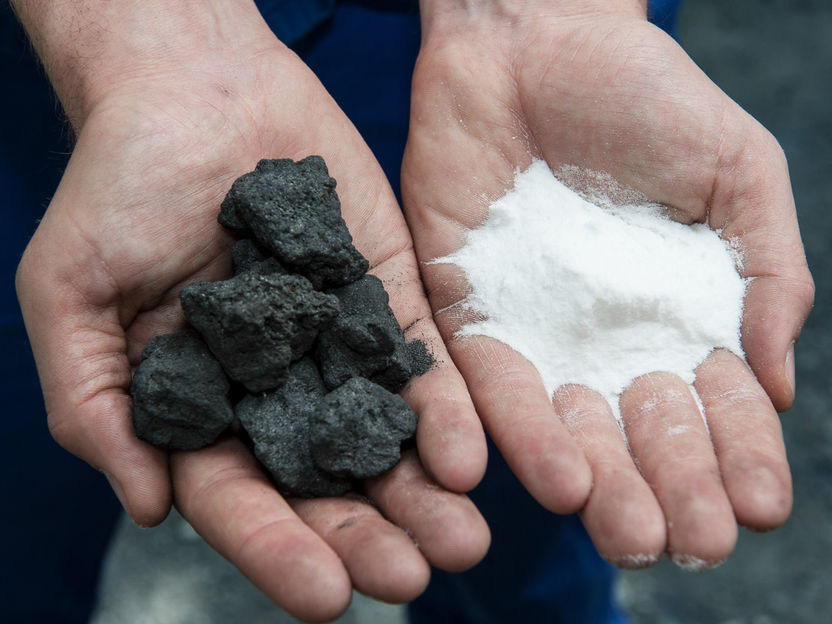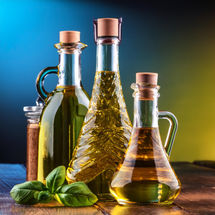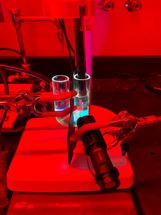Making cookies from coal?
ThyssenKrupp and TU Berlin develop new process for eco-friendly conversion of process gases
Making cookies from coal? In theory it is now possible with a completely new technology developed in a collaborative project by the Schwelgern coke plant (KBS), plant engineering company ThyssenKrupp Industrial Solutions and Berlin Technical University (TU Berlin). A pilot plant installed on the works site of ThyssenKrupp Steel Europe in Duisburg produces a substance – ammonium bicarbonate – that can actually be used as baking powder. But the idea behind the project is not to enter the food industry; the main aim of the pilot plant is to convert process gases generated during the production of coke into marketable materials such as fertilizers and chemical propellants. As an added bonus, it reduces CO2 emissions. The plant is the first of its kind worldwide.

The pilot plant converts waste products from coke production into ammonium bicarbonate in an eco-friendly way.
ThyssenKrupp Industrial Solutions AG
Groundbreaking technology converts process gas into valuable materials
“There are coke plants all over the world. With this newly developed process we want to give operators the chance to put their process gases to good use and increase the productivity of their plants,” explains Dr. Holger Thielert, Head of Gas Treatment Plant Department at ThyssenKrupp Industrial Solutions: “For this we have developed and patented a process that converts coke oven gases into valuable materials in an eco-friendly way. We can market this process worldwide and also retrofit it in existing plants.”
The new process starts with the production of coke, alongside iron ore the most important charge material for producing pig iron in the blast furnace. “For this, coal is ‘baked’ at high temperatures in the coke plant. The hot gases generated by this process contain a number of substances. The pilot plant uses a complex process to scrub the coke oven gas. Adding carbon dioxide produces ammonium bicarbonate,” says Dr. Thielert. The end products can be put to a range of uses: as nitrogen fertilizers, as propellants and foaming agents for plastics or porous ceramics, and also in the food industry.
On the way to industrial scale use
Following successful tests in the laboratory, two researchers from TU Berlin were tasked with building the pilot plant in Duisburg. “The key tests can only be carried out under real conditions,” explains Sebastian Riethof, a scientist from TU Berlin. As part of ThyssenKrupp Steel Europe’s integrated iron and steel mill in Duisburg, the Schwelgern coke plant offers ideal conditions for the test phase. “If everything goes to plan here at the coke plant, the new process can also be used on an industrial scale.” Initial results have been promising: “We are able to utilize 95 percent of the ammonia contained in the coke oven gas. Every hour the process produces 15 kilograms of solid materials from 15 cubic meters of coke oven gas and two cubic meters of carbon dioxide,” says Riethof. With this level of efficiency, the chemical products can be manufactured at competitive costs.
Pilot plant reduces CO2 emissions
If the tests continue successfully, this would be a real breakthrough in productivity and resource efficiency – also for the Schwelgern coke plant: “Here in Duisburg, almost all process gases are already being recycled efficiently,” says KBS Managing Director Peter Liszio. “If we can now manage on a long-term basis not only to produce marketable products from the coke oven gases for other sectors but also to reduce the CO2 emissions of the mill, that would be real value added with great environmental benefits.” Continued positive progress could see this idea and plant type being used worldwide in the future.
Other news from the department research and development

Get the chemical industry in your inbox
By submitting this form you agree that LUMITOS AG will send you the newsletter(s) selected above by email. Your data will not be passed on to third parties. Your data will be stored and processed in accordance with our data protection regulations. LUMITOS may contact you by email for the purpose of advertising or market and opinion surveys. You can revoke your consent at any time without giving reasons to LUMITOS AG, Ernst-Augustin-Str. 2, 12489 Berlin, Germany or by e-mail at revoke@lumitos.com with effect for the future. In addition, each email contains a link to unsubscribe from the corresponding newsletter.



























































